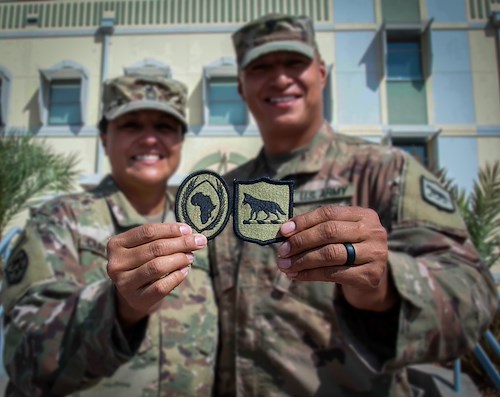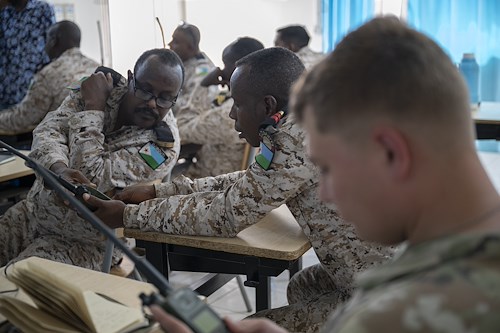Gallery contains 3 images
×
Photo 1 of 3
Combined Joint Task Force - Horn
U.S. Army Master Sgt. Promise Crawford, J4 logistics senior enlisted leader, Combined Joint Task Force – Horn of Africa (CJTF-HOA), and her brother U.S. Army Specialist Challenge Crawford, supply specialist, CJTF-HOA, hold the Africa Command and South Dakota patches, Dec. 5, 2020, at Camp Lemonnier, Djibouti. The Crawfords deployed with a unit of almost 200 soldiers from the 196th Maneuver Enhancement Brigade with the South Dakota Army National Guard in support of Operation Enduring Freedom. (U.S. Air Force photo by Senior Airman Kristin Savage)
Photo by: Senior Airman Kristin Savage
Photo 2 of 3
Combined Joint Task Force - Horn
U.S. Army Master Sgt. Promise Crawford, J4 logistics senior enlisted leader, Combined Joint Task Force – Horn of Africa (CJTF-HOA), and her brother U.S. Army Specialist Challenge Crawford, supply specialist, CJTF-HOA, stand in formation during a patching ceremony for the 196 Maneuver Enhancement Brigade (MEB), Oct. 31, 2020, at Camp Lemonnier, Djibouti. This is Promise’s third deployment and Challenge’s first, being deployed together has made the transition easier for them and their families back home. (U.S. Air Force photo by Senior Airman Kristin Savage)
Photo by: Senior Airman Kristin Savage
Photo 3 of 3
Combined Joint Task Force - Horn
U.S. Army Master Sgt. Promise Crawford, J4 logistics senior enlisted leader, Combined Joint Task Force – Horn of Africa (CJTF-HOA), and her brother U.S. Army Specialist Challenge Crawford, supply specialist, CJTF-HOA, proudly display the flag of the Fort Peck Tribes in CJTF-HOA headquarters, Dec. 5, 2020, at Camp Lemonnier, Djibouti. The Crawfords were encouraged to join the military from a young age, hearing stories of the battles their ancestors fought and stories from their uncles who served the in U.S. Army in World War II and Vietnam. (U.S. Air Force photo by Senior Airman Kristin Savage)
Photo by: Senior Airman Kristin Savage
Native American Akicitas, or warriors, are highly regarded within the culture, for their bravery and willingness to fight for themselves and their tribe. Two Akicitas, who were given the names Zuya Iya Wiyan “goes to war woman” and Wanbli Wiyaka Duta which means “eagle that flies high”, left their tribe in Montana to serve in the United States military.
U.S. Army Master Sgt. Elizabeth “Promise” Crawford, J4 Senior Enlisted Leader, Combined Joint Task Force – Horn of Africa (CJTF-HOA), and younger brother, U.S. Army Specialist Challenge Crawford, supply specialist, CJTF-HOA, heard stories of the battles their ancestors fought in as well as the wars their seven uncles and two grandfathers fought in as U.S. Soldiers. The stories and experiences they heard about were enough for them and older brother, Freedom (Toka Snokya “knows the enemy”), to join the ranks of the U.S. Army.
“We were raised up hearing stories of how the Indians were in the battle against the American Soldiers, and between themselves, you take a lot of pride in now being a part of America as a Native American, it’s something I’ve always wanted to do,” Challenge said. “As I got older, I saw my friends go away to the Marines and Army, they went off to serve and do their part and they motivated me to be a part of it.”
The Crawfords are part of the South Dakota Army National Guard and deployed to Djibouti as part of the 196th Maneuver Enhancement Brigade. Being deployed together has made the transition easier not just for the siblings but for their family back home as well.
“Our family is proud, excited and probably more relaxed because we’re both together,” Promise said. “This is Challenge’s first deployment and my third, I can definitely sense the vibe is a little different because we’re here together. I joined first, then my older brother, then eventually Challenge joined, so I have always been able to be here to help him through.”
The Crawfords grew up on the vast landscape two-million-acre Fort Peck Indian Reservation in Poplar, Montana. On the reservation, they have their own tribal government which includes a chairman, vice chairman, twelve council members and different directors for each agency, it’s a government inside a government. Although they have everything they need on the reservation, the siblings were encouraged to leave and experience what the world has to offer.
“Our parents were always the ones to push us to not settle for what’s there, they always wanted the best for us, they wanted us to get out and see the world,” Challenge said. “For me serving is something I wanted to do, it wasn’t a matter of if I’d join, it was a matter of when is the right time.”
While the Crawfords serve their country, they also have the opportunity to educate individuals on Native American culture along the way. Their culture is centered around traditions, ceremonies and community but still very similar to life outside the reservation.
“There are a lot of stereotypes about Native Americans and what life is like on the reservation, and as they get to know you they start to ask more questions such as do you have electricity, running water, why would you want to leave, etc.,” Promise said. “I have the opportunity to educate them about what life is really like on the reservation versus what they think it’s like, what they’ve seen on T.V.”
Just like his sister, Challenge takes the opportunity to enlighten others about life on a Native American reservation and to remind people that the culture is very much alive today. But there is one question he gets asked that he never thought about prior to joining.
“One of the things I’ve ran into is ‘why did you join, you joined the force that forced your people to where you are’, I can see where that question comes from but I’ve never thought of it like that,” Challenge said. “We’ve had relatives chased into Canada, ancestors who fought in the Battle of Little Bighorn, it seems contradictory to be a Native American and an American Soldier. We come from a prideful people where it’s looked highly upon to serve, I’m proud to be an American, proud to be Native American, proud to serve my country.”













